How to Overcome the Evils Rooted in the Intellect (Dante Read-Along)
(Inferno, Canto VIII): The iron gates and rebel angels. Filippo Argenti.
“Long is the way and hard, that out of Hell leads up to light.”
~ From John Milton’s Paradise Lost
Welcome to Dante Read-Along! 🌒
(If this post appears truncated in your inbox you can read it on the web by clicking here. )
Welcome to Dante Book Club, where you and I descend into Hell and Purgatory to be able to ascend to Paradise. Our guide is the great Roman poet Virgil and in this Eighth Canto we find ourselves confronting rebel angels. You can find the main page of the read-along right here, reading schedule here, the list of characters here (coming soon), and the list of chat threads here.
In each post you can find a brief summary of the canto, philosophical exercises that you can draw from it, themes, character, and symbolism explanations.
All the wonderful illustrations are done specially for the Dante Read-Along by the one and only Luana Montebello.
This Week’s Circle ⭕️
Dante and Virgil still in the Fifth Circle - The Wrathful and Sullen - The Tower and the flames - Phlegyas, the boatman of the Styx - Filippo Argenti rises from the mire - Dante rebukes him - They approach the city of Dis - Fallen angels guard the gates - Virgil is kept from bringing Dante through Dis - They need assistance to proceed
Canto VIII: Summary
The opening lines of Canto VIII are notable in a few ways: first, in that they backtrack to a previous moment in Canto VII before Dante and Virgil approached the Tower, when they had first seen its flames in the distance. In addition, Boccaccio looks to the evidence of the opening words, “I say, continuing...” claiming that Dante had been interrupted from his task after Canto VII due to his exile, and is here picking it back up. This is unsubstantiated by any other evidence, but is an interesting story.1
We are still in the Fifth circle of the Wrathful, and Dante and Virgil looked up at the tall tower and the flames burning at its peak, an answering flame in the distance. Dante asks Virgil what it means. These signal fires may be indicative of the way a watchtower would set a signal announcing the arrival of a new soul to the realm, and “perhaps the signal of the two flames on the tower was meant to indicate something unusual: that two ‘souls’ were standing on the shore instead of one.”2
Speeding toward them a small boat came through the marsh, steered by a howling Phlegyas. He becomes another disappointed guardian who is rebuked by Virgil, since they will not be under his guard, but only need the use of his boat to cross the marsh:
And just as one who hears some great deception
Was done to him, and then resents it, so
Was Phlegyas when he had to store his anger.
VIII.22-24
Climbing into the boat, Dante mentions his corporality, his heaviness as a living soul: “there seemed to be no weight until I boarded” (VIII.27), and the boat sat “more deeply than it does when bearing others” (VIII.30). This mirrors Aeneas’ experience as a live body getting into Charon’s boat in Aeneid VI.413.
The meet a sinner covered in mud who asks who they are and what they are doing there, and identifies himself as “the one who weeps” (VIII.32-36). The tone behind this declaration is of one who is scornfully declaring an injustice. This is Filippo Argenti, so named from the silver that he would shoe his horses with (argentum). He was known for his temper, and was “more irascible than any other man.”3
Dante knows him, a fellow Florentine, and as the sinner reaches out threateningly toward Dante, Virgil hits him back and, calling him a dog, rebukes him vehemently. The analogy of ‘dog’ is meaningful, here in this realm of the Wrathful; they were considered the expression of the animal passion of anger in the writings of Thomas Aquinas.4
Virgil embraces and kisses Dante, blessing him for his indignation toward Argenti. The intensity of the actions of these Wrathful, covered in mud and slime, rise to their height of expression. The others begin to tear at him, shouting his name, Filippo Argenti! Argenti even turns his teeth upon his own body, “wild with spleen” (VIII.62), a complete takeover of the animal nature.
Dante praises this treatment, the first time he is also rebuking a sin. He has so far been fearful or saddened by what he has seen; now it is like he understands the real nature of the shades he is seeing.
It is the first feeble stirring of the birth of Christ within the soul, and Virgil accordingly hails it with words that were used of Christ Himself5
Dante and Virgil turn from the Wrathful, and look toward their approach to the city of Dis, the beginning of lower Hell. This is the city of Pluto or Hades, where the sins of neglect or indulgence shift to those that are willfully violent.
The “eternal flame” (VIII.73) is making the city below red, reminiscent of Virgil’s Tartarus.6 The moats and ramparts are of iron; they circle them in the boat to the front gate.
About the gates I saw more than a thousand -
who once had rained from Heaven -
VIII.82-83
These are the fallen angels from the rebellion in heaven; they rebuke Dante for being a living soul in the land of the dead. Virgil desires to speak to them in secret, yet they continue to scorn, encouraging Virgil to leave Dante and let him find his way out alone, which filled Dante with dread. He begs Virgil not to leave him, and lists the ways in which Virgil has supported him thus far.
Virgil reassures him that their journey is willed from above and that Dante should have no fear, but to wait for him while he speaks to those at the gate. Those angels, however, quickly left and slammed the gates to Dis. Their way is blocked, and Virgil exclaims “see who has kept me from the house of sorrow!” (VIII.120).
This insolence of theirs is nothing new;
they used it once before and at a gate
less secret - it is still without its bolts-
the place where you made out the fatal text
VIII.124-127
The less secret gate he refers to is the gate of Hell found in Canto III, when Christ broke down the gate to Limbo in the Harrowing of Hell. Virgil is hopeful, however, even though their way has been barred, for:
Already well within that gate,
across the circles - and alone - descends
the one who will unlock this realm for us
VIII.128-130
Divine assistance is on the way.
💭 Philosophical Exercises:
“Solitude sometimes is best society.”
~ John Milton, Paradise Lost
It is one thing to fall into sin through weakness, another to embrace it by deliberate choice. Beyond the iron walls of the accursed city of Dis, we shall encounter sinners of intellect—those whose transgressions were not born of impulse, like lust, gluttony, or wrath, but of a deliberate embrace of evil.
From this point in the Inferno, Dante’s attitude toward sinners undergoes a profound transformation. To understand this change, we must first examine the sinner he confronts at the opening of the canto.
How to know if you ‘corrected’ your character? (Sinner who loved silver)
And while we steered across the stagnant channel,
before me stood a sinner thick with mud,
saying: “Who are you, come before your time?”(31-33)
“The stagnant channel”—stagnant, because those who dwell in anger and sullenness become fixed in time. They remain trapped in the past while life moves forward, clinging to a wound long since inflicted, their fury chained to what no longer exists.
Filippo Argenti was a Black Guelph, the faction that opposed Dante, and according to some early commentators it was Argenti’s family who got in possession of Dante’s property after he was exiled. Filippo was also famed for being so avaricious that he shod his horse with silver.
Argenti, enraged, attempts to seize Dante after being told he is where he deserves to be. But Virgil ‘shoved him back, saying: “Be off there with the other dogs!” This exchange is striking, for it marks the first time Dante does not show compassion or sorrow for a sinner’s torment, but instead openly declares that they deserve their punishment. Since Virgil embodies the faculty of reason, his act of shoving Argenti away symbolises the power of reason to defend itself, to remain unshaken by sin—in this case, wrath. This is no longer the hesitant Dante we first met in the shadowed forest, uncertain of his path. From this point on, we see a Dante who begins to grasp the nature of divine justice.
This is why Virgil throws “his arms around [Dante’s] neck” and “kisse[s his] face”. He recognises that Dante has reached the first stage of the correction of his character. In fact, it is in this canto that Virgil leaves Dante alone for the first time with his own thoughts.
But, if Dante’s character has made progress, why do they face obstacles in this canto?
Sometimes it is reasonable to sin
‘Better to reign in Hell than serve in Heaven,’ Satan famously states in Milton’s Paradise Lost. Milton’s masterpiece is peerless in its portrayal of the mind of evil, revealing how Satan schemes and justifies his rebellion.
In this canto, Dante and Virgil encounter the rebel angels—the very beings later examined in Milton’s masterpiece. For the first time, Virgil (reason) is obstructed and finds himself in need of assistance.
From this point forward, every sin is a deliberate one—the product of corrupted reason and distorted judgment. This is why, in my interpretation of Virgil in the first canto of Inferno, I did not see him as merely symbolising intellect or reason, but rather a reason illuminated by divine grace. For without grace, reason cannot truly be called ‘the good of the intellect.’
When Virgil stands before the rebel angels, it is, essentially, a confrontation between uncorrupted reason (Virgil) and reason that has been perverted (the rebels). Who could win in such a opposition?
I think we can find the answer to this question by examining what Dante tells us when he stands alone during the clash.
So he goes on his way; that gentle father
has left me there to wait and hesitate,
for yes and no contend within my head.(109-111)
Without the divine intervention our reason hesitates and ‘yes and no contend’ within our mind. Indecision. Reason alone is sufficient to confront sins of the flesh—gluttony, lust—but when faced with deliberate sins, the sins of the mind, it falters unless aided by divine intervention. This is why Dante places the scene with Argenti and the defiance of the rebel angels within the same canto. He reveals how easily reason can cast aside a sinner of the flesh like Argenti, yet how it struggles against sins rooted in the intellect.
Final thoughts
If I had to sum up, in Ciceronian manner, what the ‘philosophical exercises’ of this canto would be, I would say:
Anger and Sullenness get us transfixed in time, while life moves on.
Confidence in what is right and wrong. (Dante’s certainty about Argenti)
Once again, the limits of our reason are the limits of our world
This Week’s Sinners and Virtuous 🎭
(Themes, Quotes, Terms and Characters)
Themes 🖼️ :
Mysterious Signalling
Every commentator offers their own interpretation of this moment in the canto. Hollander suggests that the demons, as guardians of Hell, signal one another—the two lights announce the arrival of two souls, while a third light acknowledges the message. Others, like Singleton, argue that the demons on the walls are warning Phlegyas of the pair’s approach, as he appears almost instantly after the signal.
I might suggest that, since at the end of the canto Virgil tells us that someone is about to descend to unlock the gates, the signalling could also serve as a call to the higher divine powers, summoning aid for our two companions.
Dante’s unanswered questions
When Dante witnesses the lights he asks ‘the sea of all good sense’ what they mean. Virgil’s answer however is indirect, as it was when Dante asked him to interpret the meaning of inscription above the gates of Hell. But he hints that the ‘custodians of hell’ summoned Phlegyas.
Quotes 🖋️
(The ones I keep in my journal as reminders of eternal wisdom):
So he goes on his way; that gentle father
has left me there to wait and hesitate,
for yes and no contend within my head.
For it’s visual beauty:
Bowstring has not thrust from itself an arrow
that ever rushed as swiftly through the air
as did the little bark that at that moment
Characters:
- Phlegyas - King of Boeotia, and the son of Ares, and the father of Ixion and Coronis. He took vengeance on Apollo because of the violation and death of his daughter Coronis. Hermes rescued Asclepius from her womb when Apollo ordered her to die, and Chiron raised Asclepius. Phlegyas was killed by Apollo’s arrows. Dante places him as the boatman of the marshy Styx and the guardian of the Wrathful.
- Filippo Argenti - A violently tempered Florentine whose family was politically opposed to Dante.
- Dis - A name that can refer to the god Pluto, but in this sense refers to the fortress city of Dis. The Styx creates a moat around the city and its walls and towers are made of iron.
Singleton, Commentary on Inferno 121
Singleton 124
Singleton 125
“animals are naturally disposed to some excess of passion, such as the lion in daring, the dog in anger, the hare in fear…” Aquinas, Summa Theologica I-II. q. 46, a.5, ad i
Sayers Hell 121
Aeneid VI.548-550

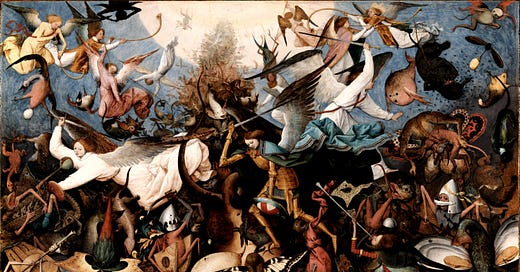



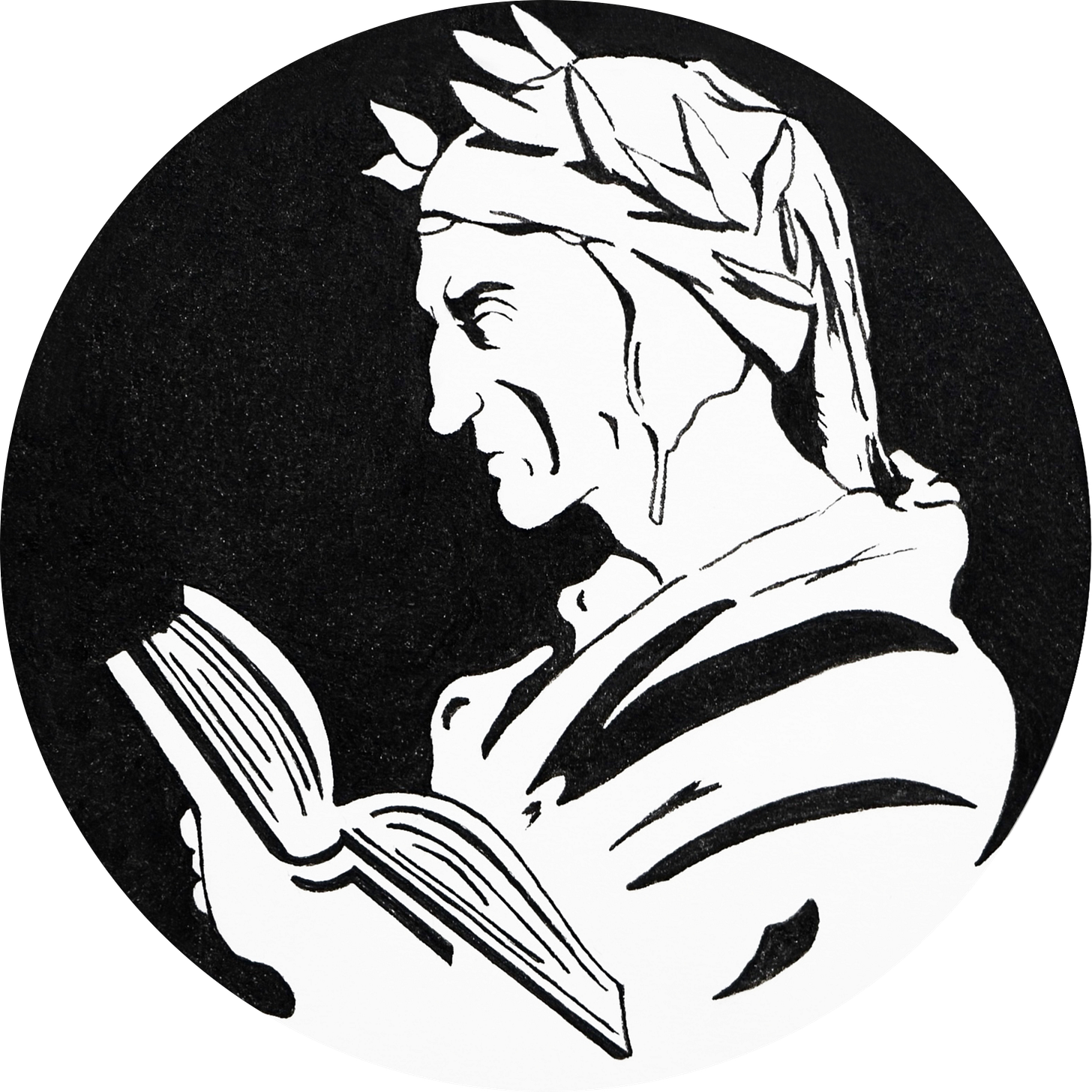




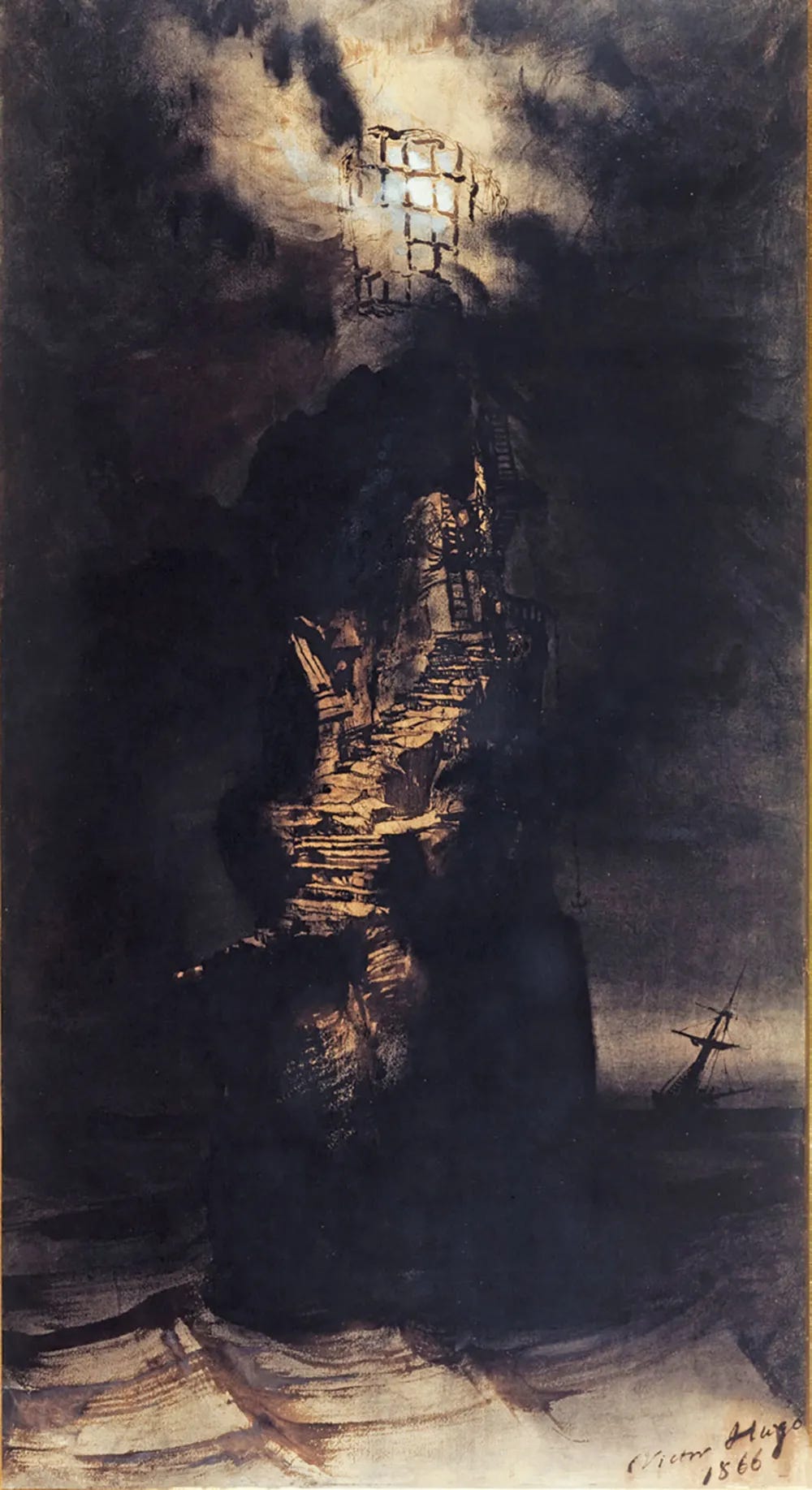
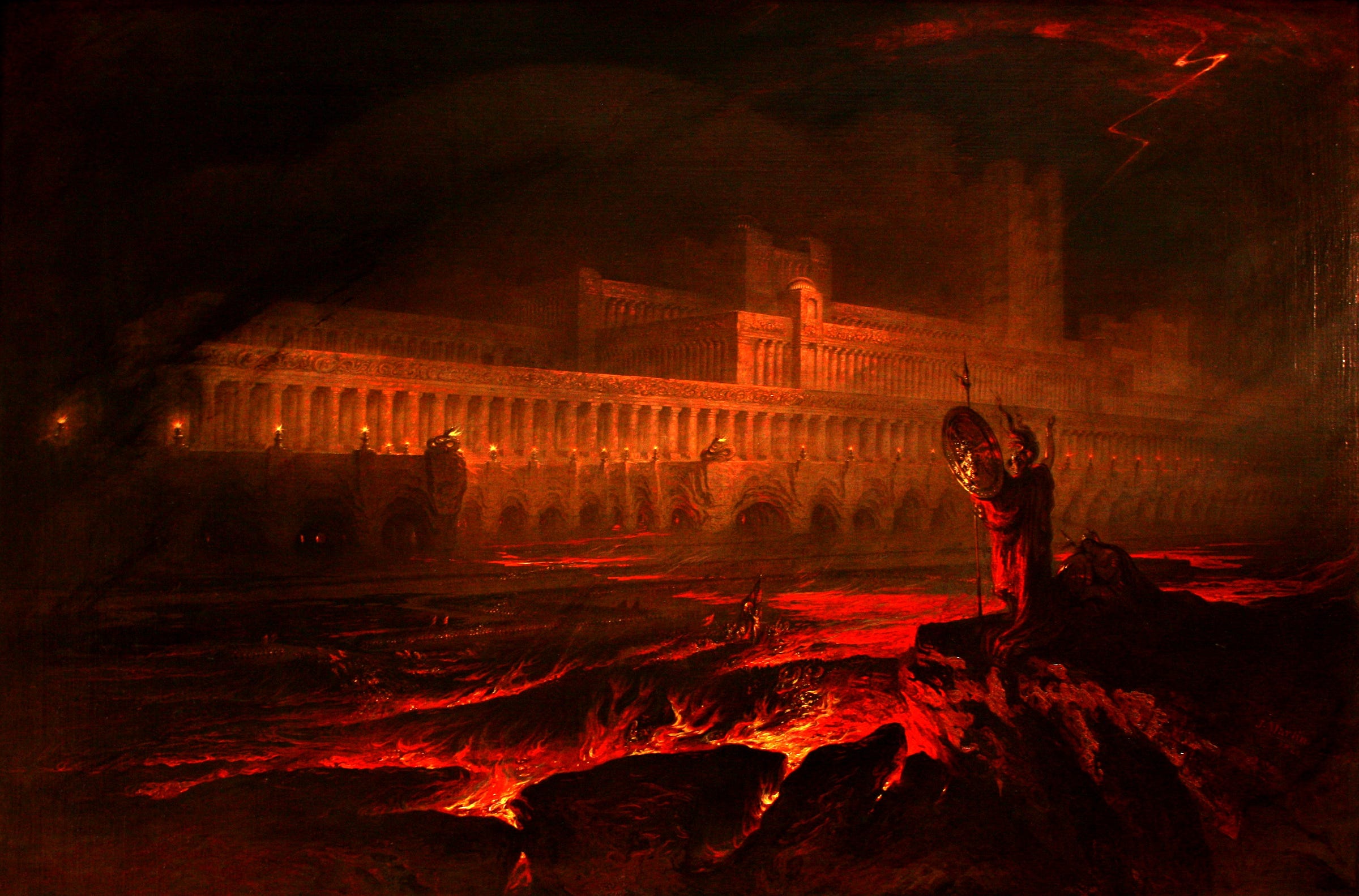

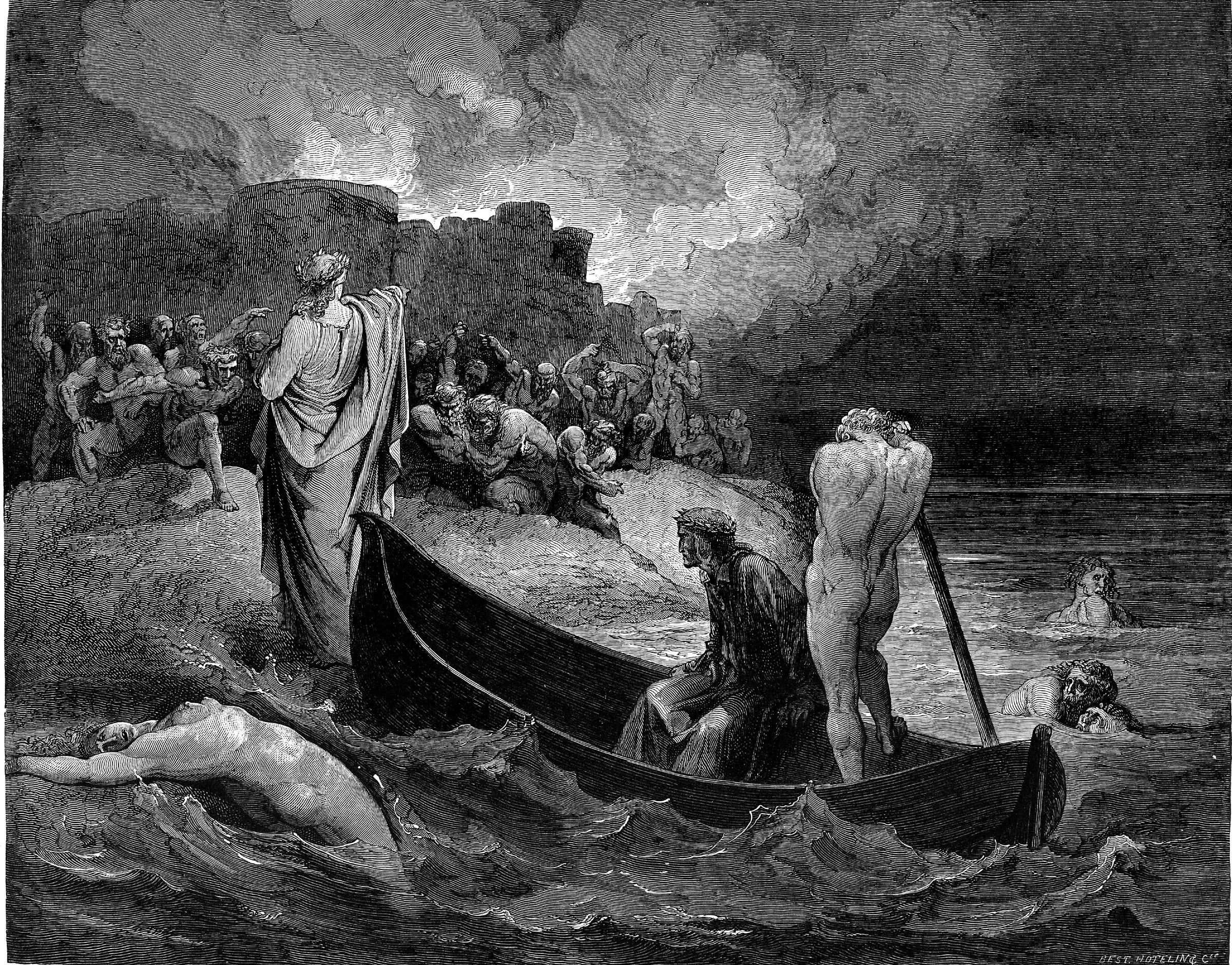

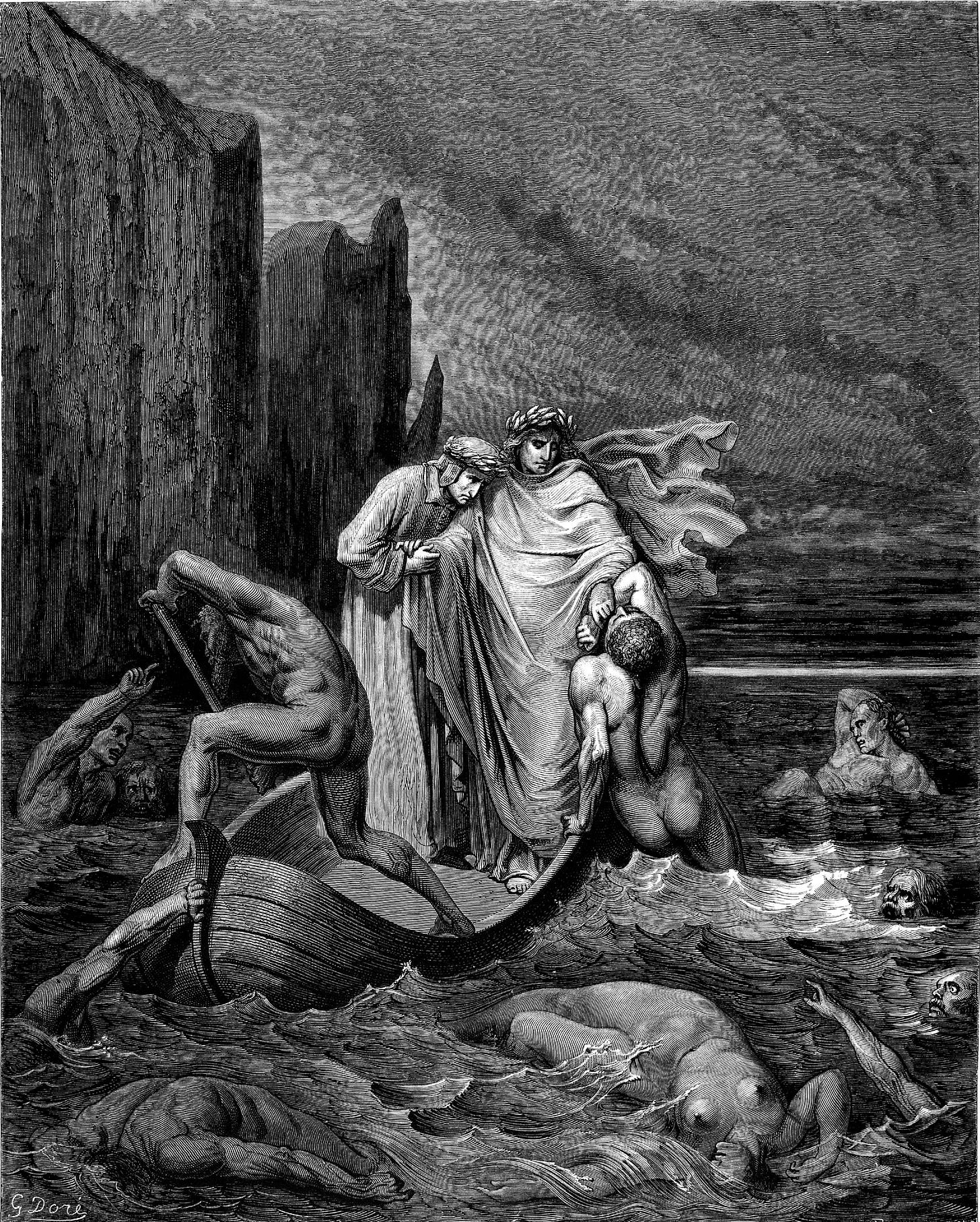

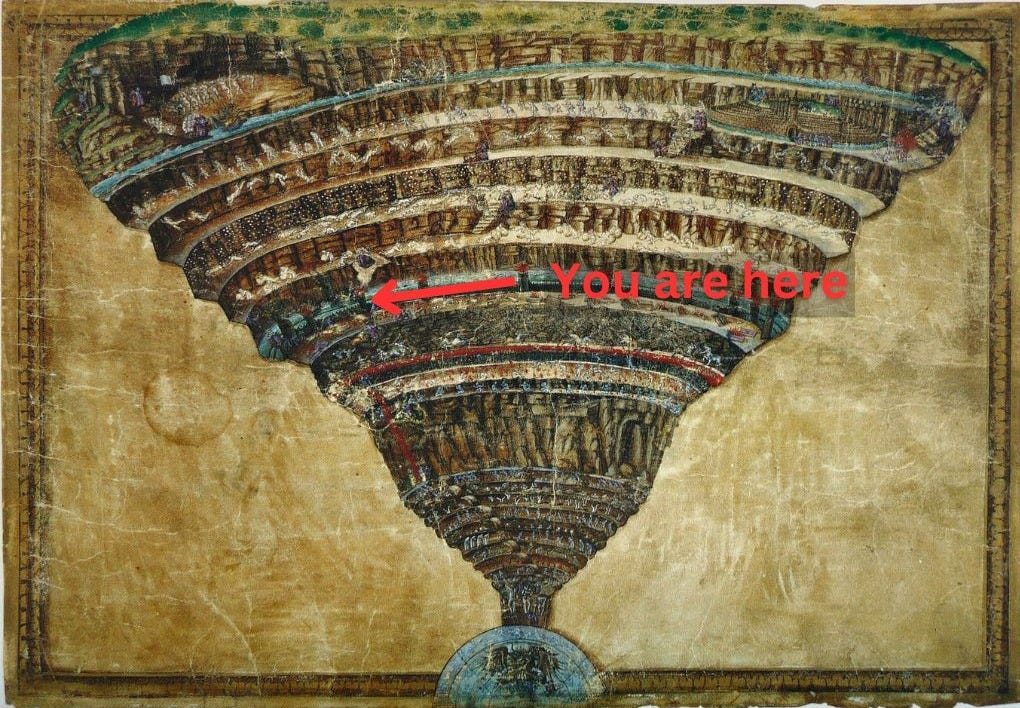

A question - Is it to obvious, simplistic, or wrong to call the grace of reason conscience? Is conscience a grace? Thanks. Den
Superb post, thank you.